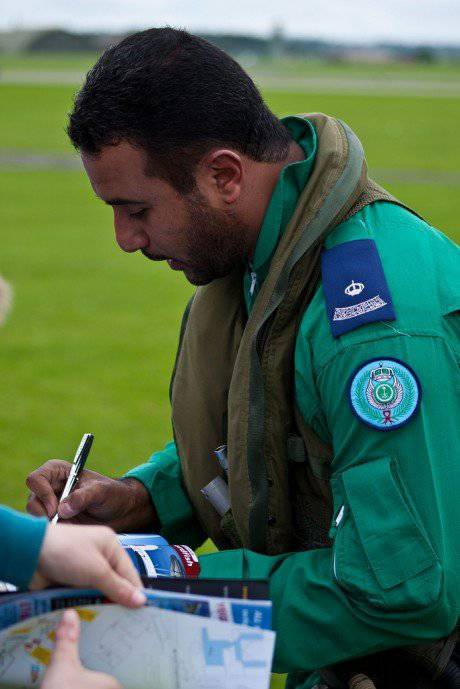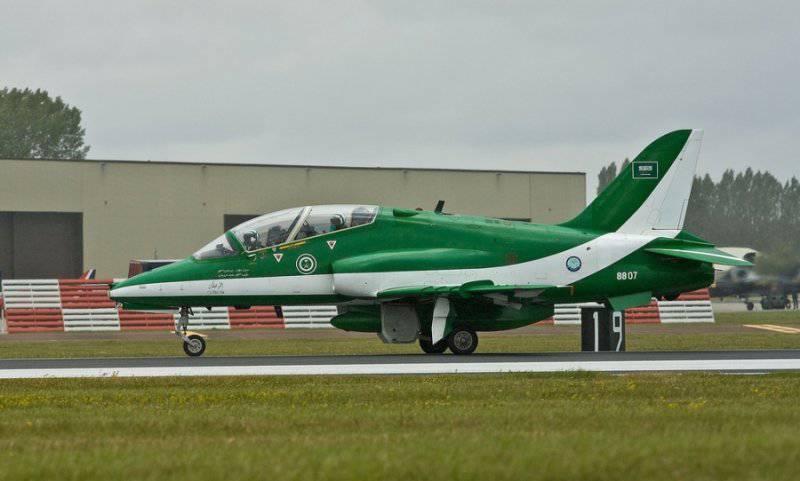Interview with the pilot of the Saudi Hawks aerobatic team
In an exclusive interview with Richard Clements (Richard Clements) of The Aviationist, the pilot of the Saudi Arabian Royal Air Force pilot group, Major Waleed Issa, speaks about the 'The Saudi Hawks'.
Formed on June 6, 1998, the 88th Royal Saudi Air Force squadron, also known as 'The Saudi Hawks', was created by Saudi Air Force Chief of Staff General Abdulaziz Henaidy with the support of Prince Sultan Bin Abdulaziz, defense and aviation.
The group, based at King Faisal Air Base (Tabuk) in the north-west of the country, flies BAE Hawk Mk65 / 65A aircraft, which were specially equipped with smoke generators and painted in a very beautiful white and green scheme.
The group’s first public appearance took place in January 1999 in Riyadh during the celebrations on the occasion of the 100 anniversary of Saudi Arabia and the following year, in Bahrain, the group made its first overseas show.
The team’s first trip to Europe took place on 2011, with a show on the Zeltweg Power Air airshow.
Shortly thereafter, the team made its first trip to the UK at the Royal International Air Tattoo (RIAT) show at Fairford airbase, where the flights were canceled on the first day of the event due to bad weather, but the next day the group delighted the audience with a dynamic show.
In 2012, the Saudi hawks once again performed at an air show in the UK, where they visited the Yowilton Royal Navy Aviation Station on Aviation Day and showed a very impressive performance and earned themselves a whole legion of new fans.
After this speech, one of his photographs was posted on the Facebook page of The Saudi Hawks, where the author met Major Issa, with whom they became friends.
On the eve of the 2013 season, Major Issa agreed to be interviewed by TheAviationist and shared his story about how he managed to become an aerobatic pilot.
 - First of all, Major Issa, thank you for taking the time to talk with us. Many people would like to know how the Saudi hawks fly and how you became a pilot.
- First of all, Major Issa, thank you for taking the time to talk with us. Many people would like to know how the Saudi hawks fly and how you became a pilot.- To become a fighter pilot was a dream of my childhood. After graduation, I decided to fulfill my dream and thank God that it came true.
- So, how did you become part of the team?
- After joining the Royal Air Force to become a fighter pilot, I saw a team at King Faisal airbase in one of the editions of the air academy. At that time I was already in the flight phase, and I was not sure that I could become one of the team members. After I graduated from the academy, about 12 years passed, the squadron commander called me to his office and said that the team needed a pilot. I ventured among the 8 candidates, and after all the trials they chose me and so I became part of the team.
- For those who have not yet seen the Saudi hawks, what can you tell?
- At the shows "Saudi hawks" perform on six aircraft. Our performance consists of two parts:
The first half: six aircraft perform aerobatics and show their art in the sky;
The second half: the team is divided into two groups and performs the figure "Palm" (crossed swords).
- You were on a team in 2012, and you are again with a team in 2013. How usually stay long in the team?
- The pilot usually stays in command around 3-4 of the year.
- When you perform at an air show, you and your teammates are very popular with the audience. How do you handle it?
- People like flying at airshows, even if they don’t know much about them. Therefore, we try to give them as much as we can, while at the same time we should give a good impression about the pilots and about the country we represent.
- If you had the opportunity to tell history your time in a team, would that be a fairy tale?
- This time really was not a fairy tale in my head, but what I can say about my experience, especially after 12 years of flying career, before I joined the team, is that the air show is not an easy job. This is very hard work, 4-6 months of hard work, the goal is to have a smile on the face of the child and his parents and everyone to be happy at the end of the day.
- In addition to BAE Hawk, on which military aircraft did you fly?
“I flew a Tornado on both fighter-interceptor versions, known as ADV (Air Defense Variant) in Saudi Arabia and F3 in the UK, and on fighter-bomber variants, known as IDS in Saudi Arabia and GR4 in the UK.
- Is there anything else you would like to say?
- Thank you for the opportunity, and wish you all the best.
- Thank you so much, Major Issa, for taking the time to answer our questions.

Information